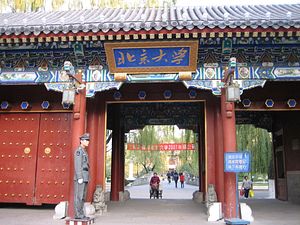Last week, NPR reported a startling story: The FBI was questioning graduates of the Yenching Academy – a master’s program aimed, in part, at bolstering China’s soft power. The goal of these interviews was, NPR suggested, to determine if American students who had participated in the program were being recruited as spies for Beijing.
I graduated from the Yenching Academy in July 2019 and yes, the United States should be worried about Chinese influence. But Yenching is only a tiny part of that growing influence and questioning returning students does little to address the real problems of China’s expanding power – soft or otherwise.
The Yenching Academy is, first and foremost, an M.A. program. Like other graduate programs focused on China, students attend class, read critical texts, and discuss, often frankly, China’s history, the current political situation, and concerns about its future. Yes, we talked about Tiananmen and Xinjiang. Yes, we talked about propaganda — texts like Never Forget National Humiliation were part of course syllabi.
It’s also a graduate program in China – and one that is fully funded, in part with money from the Chinese government. That means that not every class includes free and open discussions, certain research topics – even if mentioned in (some) classes – are understood as off limits, there is oversight from the Chinese Communist Party (CCP) and yes, the program itself is designed to help boost China’s standing on the world stage.
But these concerns are not unique to Yenching. Study abroad programs in China, even those run by U.S. universities, are subject to CCP oversight, with each program required to be a joint venture and to include CCP units with decision making power. Foreign students at other Chinese universities have lost their visas over controversial research topics. The Chinese government funds several educational projects specifically targeting foreign students. And self- censorship (and censorship) on China-focused topics has been widely acknowledged among Western scholars.
As Washington grapples with an increasingly powerful Beijing with explicit intentions of molding the existing world order to its advantage, as outlined in the most recent National Defense White Paper, the U.S. intelligence community absolutely should take appropriate steps to counter espionage and pursue relevant information about China’s activities.
The United States should also, however, be careful that these concerns do not devolve into Cold War style witch-hunts that discourage students from studying in China – or prevent those with experience in China from pursuing government jobs. Both the public and private sectors benefit from understanding the intricacies of Chinese society, laws, and government gained from living and studying abroad – including the informal lessons learned from studying within the bureaucracy of a Chinese university.
U.S. students going abroad should also be armed with critical thinking skills, complex lessons on history and political development, and frank discussions about potential threats from China. Generally, this should already be part of a university education, but reminding outbound students could reinforce vigilance and leave them better prepared to both identify potential recruitment attempts and to critically respond to them.
Moreover, Washington must recognize that China is capitalizing on America’s retreat from the world stage under Trump’s doctrine of “American First.” That approach has given China’s soft power a boost that Beijing could never achieve on its own. This is a loss for both American power and its ability to counter Beijing’s ambitions as China increasingly positions itself as an alternative to the United States with infrastructure funding, alliances, and opportunities for developing nations.
To address this trend, the United States needs to reinvest in relationships with allies and make clear its support for international organizations such as the United Nations and World Trade Organization. We also need to do a better job of attracting foreign students, make it easier for those students to stay in the U.S. after they graduate, and expand our own soft power programs like Fulbright.
None of these efforts alone are a cure-all to Beijing’s rising power. Together, however, they represent a diplomatic strategy that recognizes both the threat posed by Beijing’s ambitions and the reality of a powerful China that the United States has little choice but to engage with. Interviewing graduates of one of China’s soft power programs might be part of the answer, too, but without a more comprehensive strategy, Beijing will only continue to gain influence.
Erin Dunne is a writer based in Washington D.C. and a graduate of the Yenching Academy at Peking University, where she earned a Master of History in China Studies. She previously covered national security and defense policy for the Washington Examiner on the commentary desk. Her work has also appeared in Morocco World News, Real Clear Defense, and other publications.

































